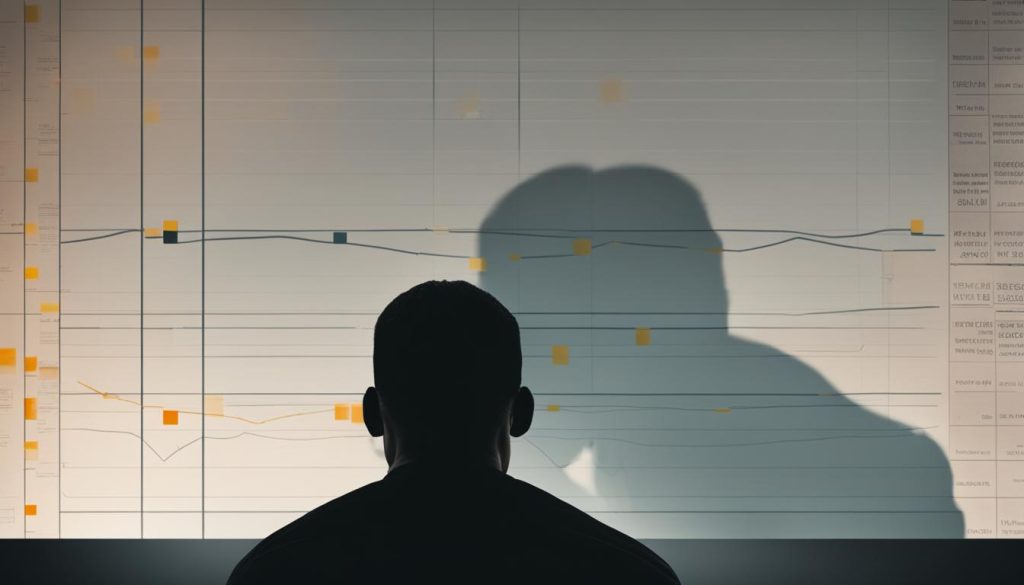Ad Blocker Detected
Our website is made possible by displaying online advertisements to our visitors. Please consider supporting us by disabling your ad blocker.
Are you struggling with feelings of anxiety? Have you ever wondered if low testosterone could be a contributing factor? In this article, we will explore the possible relationship between low testosterone and anxiety, and the impact of low testosterone on mental health.
Being diagnosed with an anxiety disorder is different from normal feelings of anxiety. Anxiety disorders can be caused by various factors, including low testosterone levels. Common anxiety symptoms caused by low testosterone include sexual dysfunction, muscle tension, difficulty focusing, and mood swings. It is important to consult a healthcare provider for diagnosis and treatment options.
Key Takeaways:
- Low testosterone levels can contribute to feelings of anxiety.
- Anxiety symptoms caused by low testosterone include sexual dysfunction, muscle tension, difficulty focusing, and mood swings.
- Consult a healthcare provider for proper diagnosis and treatment options.
- Addressing low testosterone can improve overall mental health and well-being.
Symptoms of Anxiety Caused by Low Testosterone
Low testosterone levels can have a significant impact on mental health and lead to anxiety symptoms. Understanding the common signs of anxiety caused by hormonal imbalance is crucial in seeking appropriate medical attention. Recognizing these symptoms can help individuals address their concerns and improve their overall well-being.
Men experiencing anxiety related to low testosterone levels may exhibit the following symptoms:
- Avoidance of sex
- Performance anxiety
- Muscle tension
- Difficulty focusing
- Erectile dysfunction
- Insecurity about physical traits
- Social withdrawal
- Mood swings
Experiencing one or more of these symptoms may indicate anxiety caused by low testosterone. It’s important to note that each individual may have different experiences, and symptoms may vary in intensity. Consulting a healthcare provider is essential for proper diagnosis and recommended treatment options.

As seen from the table below, these symptoms can greatly impact a person’s daily life and overall well-being:
| Symptom | Effect on Daily Life |
|---|---|
| Avoidance of sex | Strained relationship, decreased intimacy |
| Performance anxiety | Decreased sexual satisfaction, lack of confidence |
| Muscle tension | Discomfort, reduced flexibility and mobility |
| Difficulty focusing | Impaired cognitive function, reduced productivity |
| Erectile dysfunction | Sexual dissatisfaction, psychological distress |
| Insecurity about physical traits | Lowered self-esteem, body image concerns |
| Social withdrawal | Isolation, decreased social interactions |
| Mood swings | Emotional instability, relationship strain |
Understanding and addressing these symptoms is key to managing anxiety caused by low testosterone levels. Seeking medical attention allows for proper evaluation and the development of a comprehensive treatment plan tailored to each individual’s needs.
Symptoms of Low Testosterone Levels
Low testosterone levels can lead to various symptoms that can have significant impacts on both physical and mental health. Understanding these symptoms is crucial in identifying potential testosterone deficiency and its relationship with anxiety.
Physical Symptoms
One of the key signs of low testosterone levels is a decrease in sexual function. Men may experience challenges with maintaining or achieving erections, reduced sex drive, and even infertility. Additionally, low testosterone can contribute to a loss of muscle mass and strength, as well as decreased bone density. Hair reduction, hot flashes, and low blood count are also commonly associated with testosterone deficiency.
Mental and Emotional Symptoms
Low testosterone levels can significantly impact mood and mental well-being, potentially leading to feelings of anxiety. Mood swings, irritability, and difficulty concentrating are common symptoms. Individuals may also experience fatigue, amnesia, and an increase in body fat, all of which can further contribute to anxiety symptoms.
It is essential to note that experiencing one or more of these symptoms does not automatically indicate low testosterone levels, as they can be caused by various other factors. However, if combined with anxiety symptoms, it may be necessary to consult a healthcare provider for a thorough evaluation.
| Physical Symptoms | Mental and Emotional Symptoms |
|---|---|
|
|

These symptoms associated with low testosterone levels highlight the importance of addressing hormonal imbalances to improve overall well-being, including managing anxiety. Consulting a healthcare provider is crucial in diagnosing testosterone deficiency and exploring appropriate treatment options.
How Low Testosterone Causes Anxiety
Testosterone plays a crucial role in regulating mood and mental health. Abnormal levels of testosterone, whether too low or too high, can have a significant impact on a person’s emotional well-being. In the case of low testosterone levels, research suggests a strong association with feelings of anxiety and a decrease in overall mood.
When testosterone levels are low, individuals may experience heightened stress, fear, and general anxiety. These symptoms can be debilitating and adversely affect daily life. It’s essential to address the root cause of anxiety and explore potential treatment options.
Research has shown that replenishing testosterone levels can have a positive impact on anxiety relief. Testosterone therapy, under the guidance of a healthcare professional, may be an effective treatment for individuals experiencing anxiety caused by low testosterone. By restoring testosterone levels to normal, this therapy can help alleviate anxiety symptoms and improve emotional well-being.
It’s important to note that testosterone therapy should only be pursued after consulting with a healthcare provider. They will evaluate your specific situation, consider potential risks and benefits, and determine if testosterone therapy is suitable for you.
Ultimately, addressing low testosterone levels and restoring hormonal balance can contribute to overall well-being and provide relief from anxiety symptoms. If you suspect low testosterone as the underlying cause of your anxiety, seek medical attention to explore treatment options that may include testosterone therapy.
Testosterone therapy can be a viable solution for anxiety relief in individuals with low testosterone levels. Consult a healthcare professional to determine the best course of action for your specific needs.
When to Consult a Healthcare Provider
If you are experiencing physical symptoms such as weight gain, reduced sex drive, or sexual performance issues, combined with mental and emotional symptoms, it is crucial to consult a healthcare provider for a comprehensive evaluation.
A healthcare professional can assess your symptoms, conduct necessary tests, and provide an accurate diagnosis. They will also be able to recommend appropriate treatment options to address both anxiety and low testosterone.
Physical Symptoms to Watch Out For:
- Weight gain
- Reduced sex drive
- Sexual performance issues
Mental and Emotional Symptoms:
- Feelings of anxiety
- Mood swings
- Difficulty concentrating
By seeking a healthcare professional’s guidance, you can embark on a personalized treatment journey that targets both anxiety and low testosterone. Treatment may include therapy, medication, or a combination of both, depending on your specific needs.
Remember, addressing the underlying causes of anxiety and low testosterone is crucial for your overall well-being, and seeking professional consultation is the first step towards finding effective solutions.
| Physical Symptoms | Mental and Emotional Symptoms |
|---|---|
| Weight gain | Feelings of anxiety |
| Reduced sex drive | Mood swings |
| Sexual performance issues | Difficulty concentrating |

Treating Low Testosterone Levels
When it comes to managing low testosterone levels, there are several effective treatment options available. Whether you’re looking to restore testosterone levels to normal or alleviate the symptoms of anxiety, these methods can help improve your overall well-being. Consider the following ways to treat low testosterone:
- Upgrade your diet: Including testosterone-boosting nutrients in your diet, such as zinc, can promote healthy testosterone production.
- Testosterone replacement therapy: Undergoing testosterone replacement therapy in a medical facility can help balance hormone levels and alleviate symptoms caused by low testosterone.
- Ensure sufficient rest: Quality sleep is crucial for testosterone production. Strive for a consistent sleep schedule and prioritize adequate rest.
- Engage in regular exercise: Physical activity, especially weightlifting and high-intensity interval training (HIIT), can stimulate testosterone production and promote overall hormonal balance.
By incorporating these treatment options into your lifestyle, you can take proactive steps towards restoring testosterone levels and improving your mental and physical well-being.
Testosterone Replacement Therapy (TRT)
“Testosterone replacement therapy has shown great promise in helping individuals with low testosterone levels. With proper medical supervision, TRT can restore hormone balance and alleviate symptoms that may contribute to anxiety.”
If natural remedies and lifestyle changes are ineffective in boosting testosterone levels, testosterone replacement therapy (TRT) may be a suitable option. TRT involves the administration of testosterone through injections, patches, gels, or pellets under the skin. This therapy is typically supervised by a healthcare professional to ensure safety and optimal results.
A consultation with a healthcare provider is essential to determine the appropriate treatment approach for your specific case. They will evaluate your symptoms, conduct necessary tests, and recommend the most suitable treatment option.
The Benefits of Testosterone Therapy
Testosterone therapy offers numerous benefits beyond restoring hormone levels. In addition to potentially alleviating symptoms of anxiety, it can also improve:
- Sexual function
- Muscle mass and strength
- Mood and cognitive function
- Energy levels
- Bone density
- Sleep quality
- Quality of life
It is important to note that testosterone therapy is not suitable for everyone. Potential risks and side effects must be discussed with a healthcare professional to ensure informed decision-making.
In conclusion, treating low testosterone levels involves various approaches, from dietary modifications to medical interventions like testosterone replacement therapy. With the guidance of a healthcare provider, you can find the most effective treatment option to restore hormonal balance and improve your overall well-being.
Conclusion
Low testosterone levels can have a significant impact on mental health, contributing to feelings of anxiety and affecting overall well-being. If you suspect that your anxiety symptoms may be related to low testosterone, it is crucial to seek medical attention. Consulting a healthcare provider will allow you to receive a proper diagnosis and explore various treatment options tailored to your specific needs.
There are several courses of action that can be taken to manage both anxiety and low testosterone effectively. Therapy and medication can help address anxiety symptoms, while lifestyle changes, such as adopting a nutrient-rich diet, ensuring adequate rest, and engaging in regular exercise, can support testosterone production.
For individuals with low testosterone, testosterone therapy may be a viable option. This treatment approach aims to replenish testosterone levels and has been shown to alleviate stress, fear, and general anxiety. By addressing low testosterone with the guidance of a healthcare professional, you can experience improved emotional well-being and overall quality of life.
FAQ
Can low testosterone cause anxiety?
Yes, low testosterone levels can contribute to feelings of anxiety and impact overall mental health.
What are the symptoms of anxiety caused by low testosterone?
Some common symptoms include sexual dysfunction, muscle tension, difficulty focusing, and mood swings.
What are the symptoms of low testosterone levels?
Symptoms include weight gain, reduced sex drive, sexual performance issues, fatigue, loss of muscle and bone mass, and mood swings.
How does low testosterone cause anxiety?
Abnormal levels of testosterone can affect a person’s mood, and low levels of testosterone have been associated with a decrease in mood, leading to anxiety.
When should I consult a healthcare provider?
It is advisable to consult a healthcare provider if you suspect low testosterone as a potential cause of anxiety symptoms or notice physical symptoms such as weight gain, reduced sex drive, and sexual performance issues, along with mental and emotional symptoms.
What are the treatment options for low testosterone levels?
Treatment options include upgrading your diet with testosterone-boosting nutrients, undergoing testosterone replacement therapy, getting sufficient rest and quality sleep, and engaging in regular exercise.
How can managing low testosterone levels help with anxiety?
By addressing low testosterone levels, individuals can potentially alleviate symptoms of anxiety and improve their emotional well-being and overall quality of life.
Can Low Testosterone Contribute to Anxiety in Men?
Low testosterone symptoms in men may include anxiety. When testosterone levels drop significantly, men may experience increased feelings of anxiousness and worry. It’s important for men experiencing low testosterone symptoms to consult with a healthcare professional to discuss potential treatment options.


